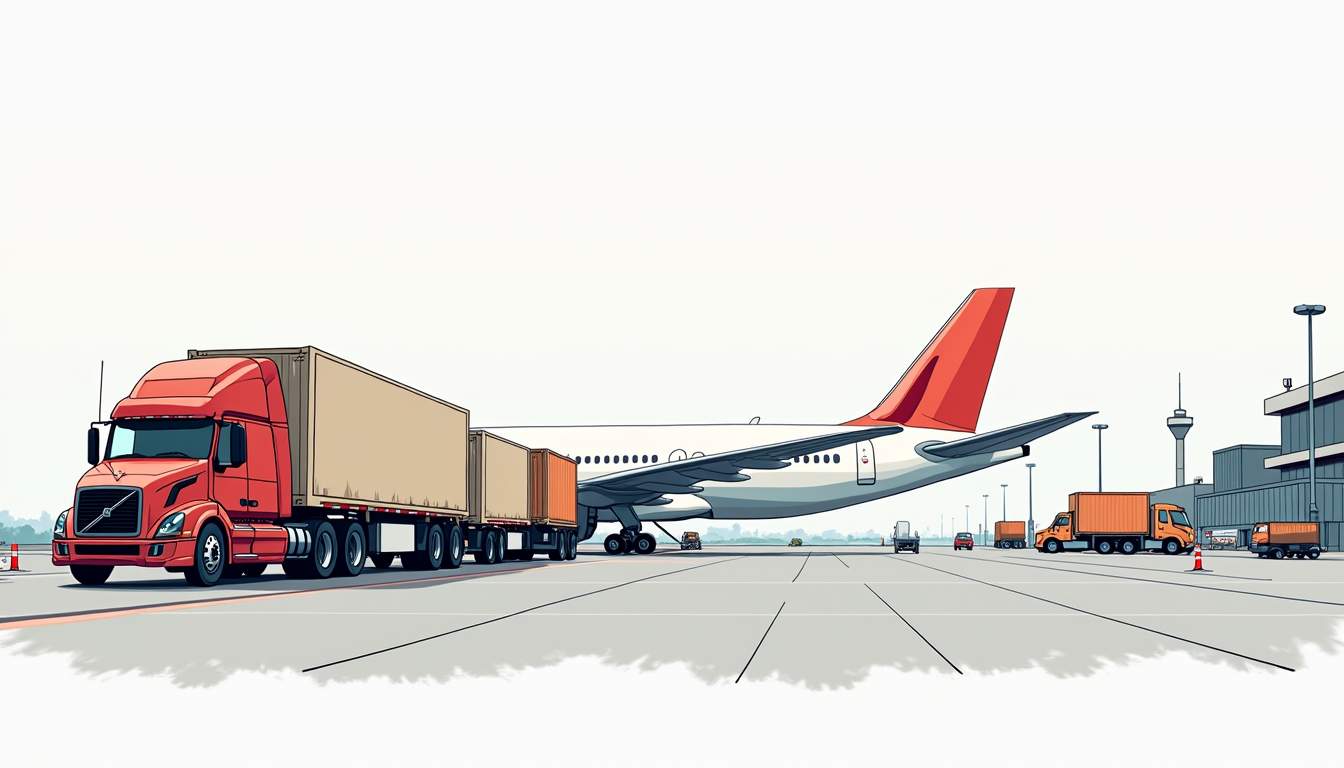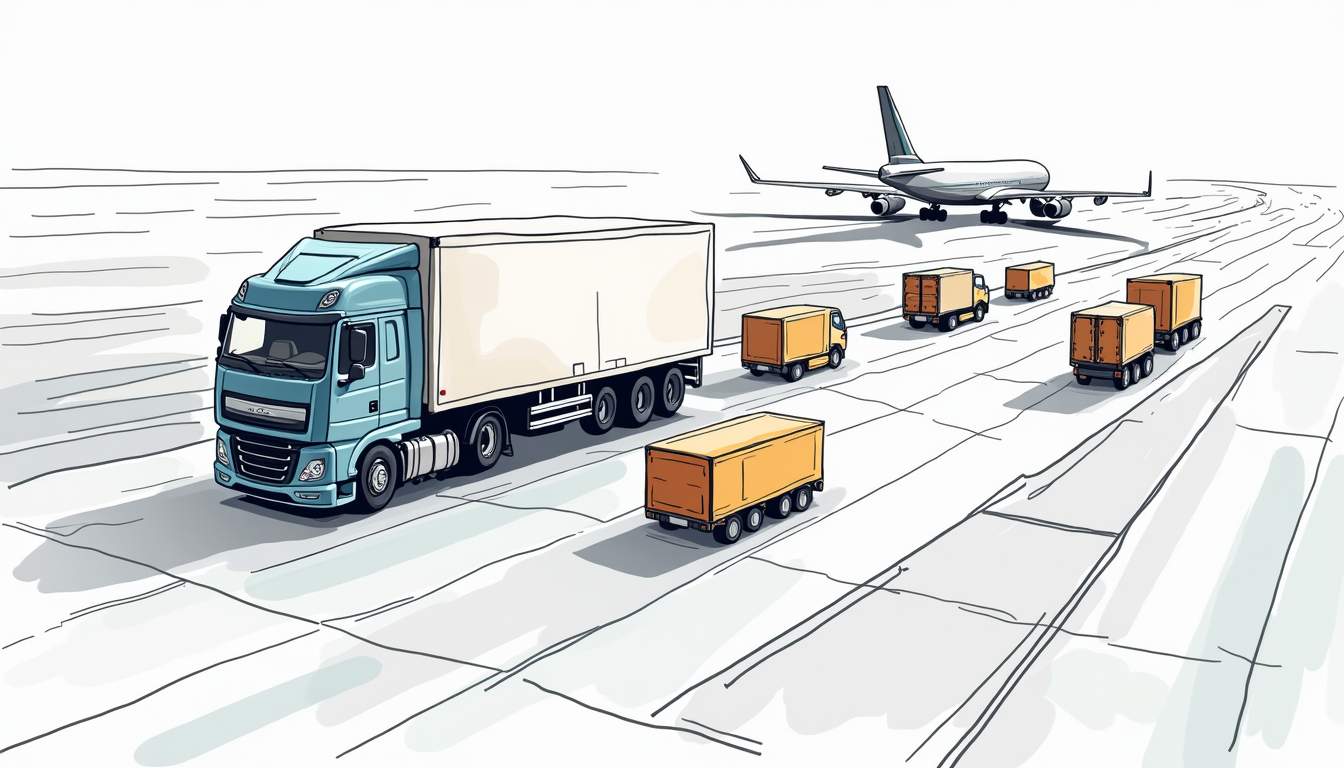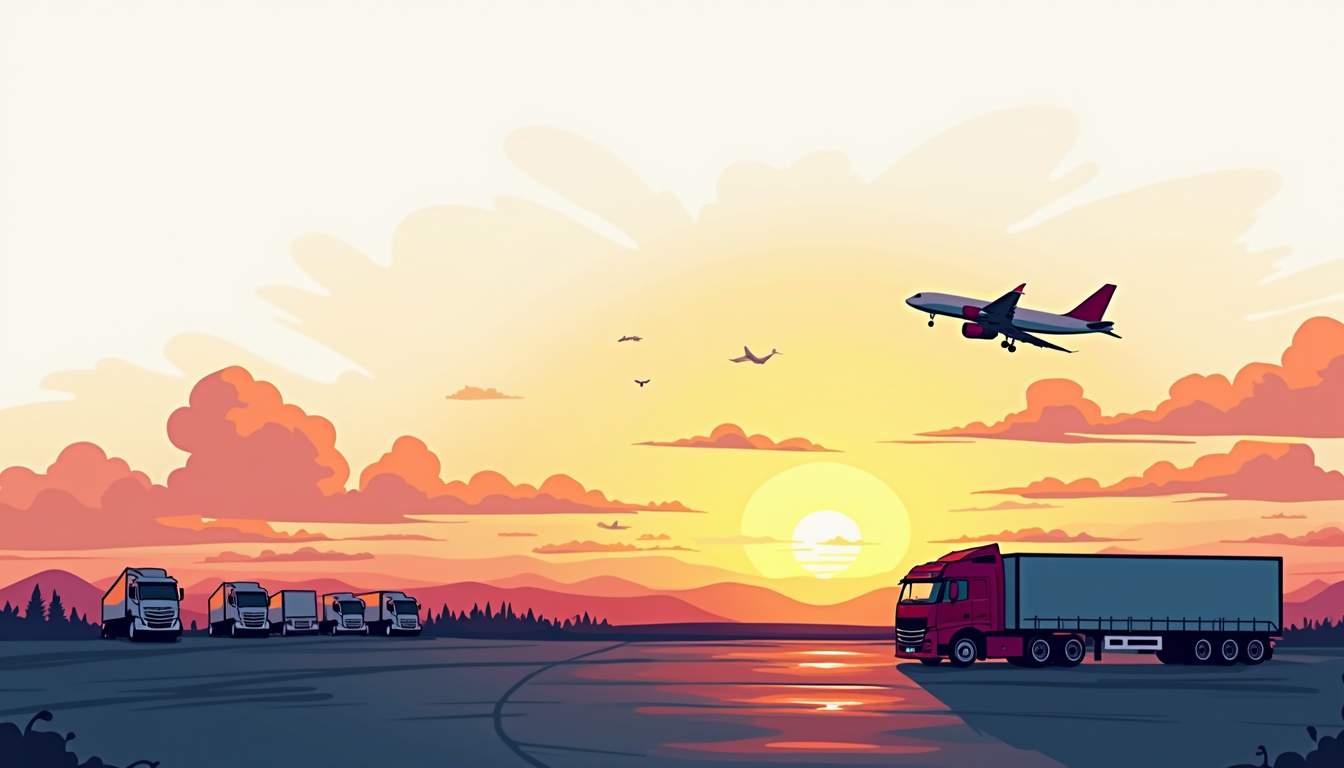Trucking for Air Cargo
The logistics industry is a complex web of transportation modes, and trucking plays a pivotal role in the movement of air cargo. As global trade continues to expand, the demand for efficient and reliable transportation solutions has never been higher. This article delves into the intricacies of trucking for air cargo, exploring its significance, challenges, and the evolving technologies that are shaping the future of this essential service.
The Importance of Trucking in Air Cargo Logistics
Trucking serves as a vital link in the air cargo supply chain, facilitating the seamless movement of goods from their origin to airports and ultimately to their final destination. The efficiency of this process can significantly impact delivery times and customer satisfaction.

Connecting Land and Air
Air cargo is often perceived as a fast and efficient means of transporting goods over long distances. However, the journey begins on the ground. Trucking operations are responsible for transporting cargo to and from airports, ensuring that shipments are delivered on time for their scheduled flights. This connection between land and air is crucial, as delays in trucking can lead to missed flights and increased costs. Furthermore, the integration of advanced technologies such as GPS tracking and automated scheduling systems has revolutionized the trucking industry, allowing for more precise coordination with air freight schedules. This not only enhances efficiency but also provides shippers with peace of mind, knowing their goods are being monitored throughout the entire journey.
Meeting Demand for Speed and Reliability
In today’s fast-paced market, businesses are increasingly relying on air cargo to meet customer demands for quick delivery. Trucking services must adapt to this urgency by optimizing routes, enhancing tracking capabilities, and ensuring that cargo is handled with care. The ability to provide real-time updates to clients about their shipments has become a competitive advantage in the trucking industry. Additionally, as e-commerce continues to grow, the demand for expedited shipping options has surged, pushing trucking companies to innovate further. Many are now investing in electric and hybrid vehicles to reduce their carbon footprint while still meeting tight delivery windows, demonstrating a commitment to sustainability alongside efficiency.
Cost Considerations
While air freight is often more expensive than other modes of transportation, trucking plays a crucial role in managing overall logistics costs. Efficient trucking operations can help minimize delays and reduce the risk of damage to goods, ultimately leading to cost savings for businesses. By strategically planning routes and consolidating shipments, trucking companies can offer competitive pricing while maintaining high service levels. Moreover, the rise of digital freight platforms has enabled shippers to compare rates and services from multiple trucking providers, fostering a more competitive environment that can drive down costs. This transparency not only benefits businesses looking for cost-effective solutions but also encourages trucking companies to continuously improve their service offerings to attract and retain clients.
Challenges in Trucking for Air Cargo
Despite its importance, trucking for air cargo is not without challenges. Various factors can complicate operations, from regulatory hurdles to environmental concerns. Understanding these challenges is essential for companies looking to navigate the complexities of air cargo logistics.

Regulatory Compliance
Trucking companies must adhere to a myriad of regulations that govern transportation safety, emissions, and cargo handling. Compliance with these regulations can be a daunting task, particularly for smaller companies that may lack the resources to stay updated on changing laws. Failure to comply can result in fines, delays, and damage to a company’s reputation. Additionally, the regulatory landscape is often fragmented, with different jurisdictions imposing varying requirements. This can create confusion and necessitate a more robust compliance strategy that includes regular training and updates for staff, as well as investment in compliance management systems.
Environmental Impact
As the world becomes more environmentally conscious, trucking companies are under increasing pressure to reduce their carbon footprint. This includes adopting greener technologies, optimizing routes to reduce fuel consumption, and exploring alternative fuels. Balancing the need for efficiency with environmental responsibility is a challenge that the industry must address. Furthermore, many companies are now investing in electric and hybrid vehicles, which, while promising, come with their own set of challenges, such as the need for charging infrastructure and the higher upfront costs associated with these technologies. The transition to sustainable practices also requires a cultural shift within organizations, where employees at all levels must embrace eco-friendly initiatives as part of their operational ethos.
Driver Shortages
The trucking industry is facing a significant shortage of qualified drivers, which poses a challenge for air cargo logistics. With an aging workforce and a lack of new entrants, companies are struggling to find skilled drivers to meet the growing demand for transportation services. This shortage can lead to delays and increased costs, impacting the overall efficiency of air cargo operations. To combat this issue, many companies are implementing innovative recruitment strategies, offering competitive salaries, and enhancing training programs to attract younger drivers. Additionally, the industry is exploring the use of technology, such as automated driving systems, to alleviate the burden on human drivers. However, the integration of such technologies raises its own set of questions regarding safety, liability, and the future role of human operators in the logistics chain.
Technological Advancements in Trucking
As the logistics landscape evolves, technology is playing a transformative role in trucking for air cargo. From advanced tracking systems to automated vehicles, these innovations are reshaping how goods are transported and managed.
Real-Time Tracking and Visibility
One of the most significant advancements in trucking is the development of real-time tracking systems. These technologies allow companies to monitor shipments throughout the entire transportation process, providing visibility to both the carrier and the customer. This transparency helps in managing expectations and improving overall service quality. Furthermore, with the integration of Internet of Things (IoT) devices, companies can gather data on the condition of the cargo, such as temperature and humidity, ensuring that sensitive goods are transported under optimal conditions. This level of detail not only enhances customer trust but also minimizes the risk of loss or damage, leading to a more efficient supply chain.
Route Optimization Software
Route optimization software has revolutionized how trucking companies plan their deliveries. By analyzing traffic patterns, weather conditions, and other variables, these tools can identify the most efficient routes, reducing travel time and fuel consumption. This not only enhances operational efficiency but also contributes to lower environmental impact. Additionally, many of these systems incorporate machine learning algorithms that continuously improve their recommendations based on historical data and real-time inputs. As a result, trucking companies can adapt to changing conditions on the fly, further streamlining their operations and reducing costs associated with delays and unexpected detours.
Autonomous Vehicles
The advent of autonomous vehicles has the potential to change the face of trucking for air cargo. While still in the early stages of development, self-driving trucks could address the driver shortage issue and improve safety on the roads. As technology continues to advance, the integration of autonomous vehicles into logistics operations may become a reality. Moreover, these vehicles are designed to operate with enhanced precision and efficiency, utilizing advanced sensors and artificial intelligence to navigate complex environments. This could lead to a significant reduction in accidents caused by human error, making roads safer for all users. As regulatory frameworks evolve to accommodate these innovations, the trucking industry is poised for a dramatic shift that could redefine logistics as we know it.
The Future of Trucking for Air Cargo
Looking ahead, the future of trucking for air cargo is likely to be shaped by ongoing advancements in technology, changing consumer expectations, and evolving regulatory landscapes. Companies that can adapt to these changes will be well-positioned to thrive in the competitive logistics market.
Emphasis on Sustainability
As environmental concerns continue to rise, sustainability will become a focal point for trucking companies. This may involve investing in electric or hybrid vehicles, implementing fuel-efficient practices, and exploring alternative energy sources. Companies that prioritize sustainability will not only meet regulatory requirements but also appeal to environmentally conscious consumers.
Enhanced Collaboration Across the Supply Chain
The future of air cargo logistics will likely see increased collaboration between trucking companies, airlines, and other stakeholders. By fostering partnerships and sharing data, companies can create a more integrated and efficient supply chain. This collaboration can lead to improved service levels, reduced costs, and enhanced customer satisfaction.
Adapting to E-commerce Growth
The rise of e-commerce has transformed the logistics landscape, and trucking for air cargo must adapt accordingly. As online shopping continues to grow, the demand for fast and reliable delivery services will increase. Trucking companies will need to develop innovative solutions to meet these demands, including same-day delivery options and streamlined returns processes.
Conclusion
Trucking for air cargo is an essential component of the global logistics network, connecting businesses and consumers across vast distances. While challenges exist, the industry is poised for growth and innovation. By embracing technology, focusing on sustainability, and enhancing collaboration, trucking companies can navigate the complexities of air cargo logistics and deliver exceptional service to their customers.

As the logistics landscape continues to evolve, staying informed and adaptable will be crucial for success. The future of trucking for air cargo holds great promise, and those who can leverage new technologies and strategies will undoubtedly lead the way in this dynamic industry.
Ready to Elevate Your Air Cargo Experience?
At Freighter Gator, we understand the critical role trucking plays in the air cargo logistics chain. Our commitment to speed, reliability, and innovation ensures your cargo is in expert hands from takeoff to touchdown. If your business demands the highest level of time-critical freight solutions, look no further. Request a Quote today and partner with Freighter Gator for air cargo services that deliver on time, every time.
